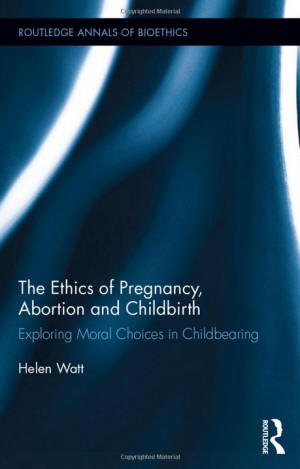Book Review
The Ethics of Pregnancy, Abortion and Childbirth
Exploring Moral
Choices in Childbearing
Helen Watt
Routledge
ISBN: 978-1138188082
 This
is a fine philosophical examination of the ethics of pregnancy. As the
author has stated, there is a uniquely close relationship between the
pregnant woman and the foetus. To regard them as rivals with conflicting
interests is ultimately unhelpful. The author examines four common
approaches to pregnancy: uni-personal, neighbourly, maternal and spousal.
This
is a fine philosophical examination of the ethics of pregnancy. As the
author has stated, there is a uniquely close relationship between the
pregnant woman and the foetus. To regard them as rivals with conflicting
interests is ultimately unhelpful. The author examines four common
approaches to pregnancy: uni-personal, neighbourly, maternal and spousal.
According to one view, the foetus is to be regarded as the woman's property. As the author argues, few in the pro-choice camp would claim that the woman ought to do whatever she wishes with no restrictions simply based on the bodily location of the foetus inside of her. Another view is to regard the womb as inherently valuable as a means of protecting children. But this view sees no relational significance between the woman and the foetus. She is to be regarded like the Good Samaritan protecting the foetus in a somewhat external manner. The author argues that bodily relations really do matter, but not in the way proposed by the first view. Certainly, the foetus is dependant on the woman. But does that mean that the foetus is worth less than the woman? In an absolute autonomy focused bioethics, the answer might be yes. In contrast, the author argues that dependency does not lessen the moral status of the foetus. Quite the contrary: "After all, the dependency of infants-sometimes on a single adult in an isolated area-is not normally thought to reduce their moral claim ...."
What is the moral status of the foetus? It could be argued that it is equal to that of any other human person based on the principle that the foetus is a person with potential, with basic capacity. That is how this reviewer would have argued, but no longer because such remarks are misleading if by "basic capacity" is meant a capacity that some human beings have that others do not. What about the dying foetus or the disabled foetus.? Do they have lesser rights than healthy ones ? If what we care about are "objective interests of continuing human subjects, what we really want to know is when these subjects exist so as immediately to have those interests..."
There are tendencies, says the author, which reveal the human rational orientation seen in the structure and potential of the foetus, including blocked potential due to missing or damaged features. I find this argument really helpful because I never thought much of the "you will be aborting Beethoven if you had aborted a foetus whose father is alcoholic and whose mother is sick, having given birth to four children already" argument. A foetus ought surely to be thought of as having value irrespective of whether the foetus becomes Beethoven or a severely disabled person.
But what about the sperm and ovum? Do they not also have potential? This is a common pro-choice argument against the pro-life position. The author argues that the life of the sperm and ova is that of living parts rather than living wholes. The very existence of the gametes end once the sperm and ovum fuse. The gametes are thus not potential lives but potential causes of life.
The orientation of the embryo is to develop as that particular embryo from fertilisation and twinning is the "exception that proves the rule."
There are so many other points of note in this work. What about abortion in a comatose woman? The author argues that "to carry out an abortion on an unconscious woman who does not know that she is pregnant seems to violate existing maternity, and to be an egregious assault on the woman for that reason." What about abortion following rape? The author writes that "the violent act that caused the presence of the child is in the past and cannot now be undone; the presence of the child can indeed be 'erased' but not without harm and injustice to both parties."
Is the foetus one of us? In order to answer that question, we need to answer other questions. Are we our bodies? Yes, even our thoughts appear to be embodied. By examining other questions, the author shows that there are problems with theories that separate the thinking subject from the bodily organism.
The uniqueness of this valuable work is in its examination of ethical issues in relation to pregnancy that have not been looked at in such depth previously. It leaves this reviewer more committed to the defence of life from conception than ever.
Reviewed by Dr Pravin Thevathasan
